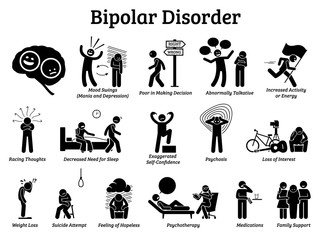- Home
- Bipolar Mood Disorder
Bipolar Mood Disorder Treatment in Mumbai
BIPOLAR MOOD DISORDER

Experiencing changes in your mood is part of being human. However, if you have bipolar disorder, your mood changes will be more extreme and may last for longer periods. You are likely to experience two highly contrasting mood states – mania and depression.
During mania, you can feel elated and euphoric. You may have lots of energy, and feel you don’t need as much sleep as usual. Your thoughts may race and you may also talk fast. You can be the life of the party and feel confident and invincible. As the mania continues, you may start feeling irritable and aggressive. Your thoughts can become muddled or even delusional.
During depression you can feel pessimistic and very low. You may have little energy and can experience changes to your sleeping pattern – from insomnia to excessive sleeping. You may burst into tears for no apparent reason, and withdraw from social life. Your thoughts may be slow, and concentration can be poor, as can interest in daily life. You may feel hopeless and have thoughts of ending your life.
There are different types of bipolar disorder, and they can vary greatly in how strongly you experience mood changes – although all forms of bipolar disorder can seriously affect how you live your life. Bipolar episodes usually last at least a week, and the time between episodes can differ from person to person, and over time – from days to months, or years. You may have just one or two in your whole life.
It can be difficult to identify bipolar disorder, as the changes to your mood might seem like separate and unconnected events. For this reason, some people can go for years without being diagnosed. Bipolar and related disorders can start at any age, although they are more likely to start during the teen years or early twenties.
People with bipolar disorder may not always think or communicate clearly, and they may lash out. Try not to take it personally. You can learn to recognize and anticipate the extremes in mood that someone with bipolar disorder experiences and understand their limits in controlling these ups and downs.
Bipolar disorder can strain families and friendships. It may help to organize a close group of friends to share the load where possible. Family therapy can help family members understand their own limits, as well as those of the person with bipolar disorder.

